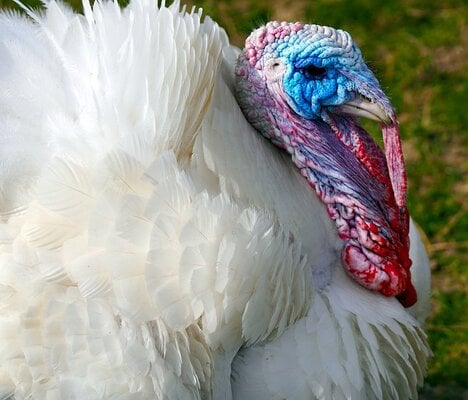The trend of raising backyard turkeys has grown in popularity as people become more interested in sustainable living. Aside from providing fresh and nutritious meat, they can also produce eggs and serve as natural pest control. To ensure their health and well-being, it's important to understand their housing and space requirements when raising backyard turkeys.
Also, make sure the shelter has good ventilation so moisture doesn't build up. By placing windows or vents near the roofline, hot air can escape, and turkeys can be protected from direct drafts.
As turkeys have a tendency to slip and injure themselves, the shelter's flooring should be easy to clean and non-slippery. You can keep the floor clean and dry by covering it with straw or wood shavings.
Last but not least, the shelter should have a secure door that can be locked at night to keep raccoons, foxes, and coyotes out. Predators will also be kept out of the shelter if you install a fence around the perimeter.

Turkeys need a lot of space to spread their wings and fly short distances, which is why they require a lot of space. A large outdoor area can also reduce the risk of injury and prevent aggression between birds.
A covered area is also necessary to protect turkeys from extreme weather conditions, such as hot sun or heavy rain. In order to achieve this, a simple shelter could be provided or even trees or shrubs could be planted to provide shade.

Fresh water is also a necessity for turkeys. It is important to provide a clean and accessible source of drinking water in order to prevent dehydration and ensure good health.
The feed and water containers of turkeys can quickly become contaminated with feces and dirt because turkeys are messy eaters and drinkers. To prevent disease spread, feed and water containers should be cleaned and refilled regularly.

Providing a clean and dry living environment, fresh water, and a balanced diet is crucial to promoting good health. You should also have a veterinarian on hand in case of illness or injury so they can provide advice and care.
A minimum of 10 square feet is recommended per turkey for outdoor free roaming and foraging. The importance of regular observation and monitoring is also important, as are feeding and watering requirements.
Are you raising any turkeys? Share your experiences below.
Housing Requirements
Shelter is necessary to protect turkeys from extreme weather conditions and predators. It is important to consider the number of turkeys you plan to raise when choosing a shelter size. As a general rule, each bird should have at least 4 square feet of floor space. This gives the turkeys enough room to move around and perch.Also, make sure the shelter has good ventilation so moisture doesn't build up. By placing windows or vents near the roofline, hot air can escape, and turkeys can be protected from direct drafts.
As turkeys have a tendency to slip and injure themselves, the shelter's flooring should be easy to clean and non-slippery. You can keep the floor clean and dry by covering it with straw or wood shavings.
Last but not least, the shelter should have a secure door that can be locked at night to keep raccoons, foxes, and coyotes out. Predators will also be kept out of the shelter if you install a fence around the perimeter.
Space Requirements
To roam and forage, turkeys need a large amount of outdoor space. As a general rule of thumb, each bird should have at least 10 square feet of outdoor space. Turkeys will be able to forage for food without being restricted. This can also reduce their feed costs.Turkeys need a lot of space to spread their wings and fly short distances, which is why they require a lot of space. A large outdoor area can also reduce the risk of injury and prevent aggression between birds.
A covered area is also necessary to protect turkeys from extreme weather conditions, such as hot sun or heavy rain. In order to achieve this, a simple shelter could be provided or even trees or shrubs could be planted to provide shade.
Feeding and Watering
To keep turkeys healthy, they need a balanced diet, including high-protein feed, as well as access to fresh water. A balanced diet is essential to ensure the birds' nutritional needs are met while avoiding overfeeding, which can contribute to obesity.Fresh water is also a necessity for turkeys. It is important to provide a clean and accessible source of drinking water in order to prevent dehydration and ensure good health.
The feed and water containers of turkeys can quickly become contaminated with feces and dirt because turkeys are messy eaters and drinkers. To prevent disease spread, feed and water containers should be cleaned and refilled regularly.
Health and Care
There are many health issues that turkeys are susceptible to, including respiratory infections, parasites, and bacterial infections. You can detect and prevent serious health issues in your birds by regularly observing and monitoring them.Providing a clean and dry living environment, fresh water, and a balanced diet is crucial to promoting good health. You should also have a veterinarian on hand in case of illness or injury so they can provide advice and care.
Summary
Backyard turkeys require a lot of space and housing. Sheltering birds from extreme weather conditions and predators, with proper ventilation and secure doors, is essential. A minimum of 4 square feet of floor space per bird is required, along with bedding to maintain a clean and dry environment.A minimum of 10 square feet is recommended per turkey for outdoor free roaming and foraging. The importance of regular observation and monitoring is also important, as are feeding and watering requirements.
Are you raising any turkeys? Share your experiences below.

